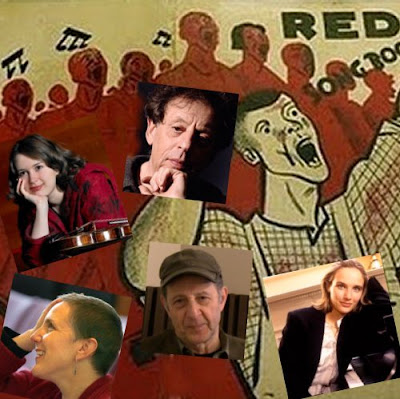Virtue signalling does not sell concert tickets
This article is unique among the 4554 posts uploaded to On An Overgrown Path since August 2004. Because it agrees with a Slipped Disc post. Last week Norman uploaded a Slipped Disc reader's contribution headlined 'Why I won't be going back to concerts'. The thrust of the contribution was not the reader's fear of COVID, but how for him concerts had become "just a bit too often ordinary... a bit of a ritual". Which resonates with my recent post 'Where has all the musical adventurousness gone?' lamenting the demise of musicians who is transcend conventions and pursue their own unique musical visions.
David Munrow is talking to Peter Maxwell Davies in that photo. In the early 1970s David Munrow’s Pied Piper radio programme was broadcast four times a week for five years and introduced a new audience to early music. He presented a successful TV series, and wrote scores for the BBC TV series The Six Wives of Henry VIII and Elisabeth R, and he contributed early music to several major feature films including Ken Russell’s The Devils, which also featured original music by Peter Maxwell Davies. Pied Piper was technically a children's programme but the average age of its huge audience was 29, precisely the young new audience classical music lusts after today. David Munrow's early music was difficult, unfamiliar and challenging, yet it reached a mass market way beyond the wildest dreams of today's classical marketeers. So where has classical music gone wrong? Why are some (many?) people not going back to concerts?
You do need to be a rocket scientist, or even a social media-fixated classical marketeer to answer those questions. Fairly recently the classical industry took on board what some of us had been saying long before the advent of 'click bait', namely that classical music has a serious equality problem. So far so good. But then the classical industry went very wrong by assuming that having started rectifying institutional inequality, virtue signalling would sell concert tickets. The error of this strategy is not difficult to illustrate. You have a car to sell; but it has a brake problem. So, of course, you get the brakes fixed. But you don't then advertise it with the headline 'Faulty brakes fixed'.
Slipped Disc reader MSC laments today's ordinary and ritualistic concerts. It would be difficult to imagine a concert less ordinary and more mould-breaking than the 1974 BBC Prom when David Munrow, Peter Maxwell Davies, the Early Music Consort, and The Fires of London performed music by Dufay and from The Devils soundtrack. This concert started at 7.30 pm, not at the midnight hour that any vaguely challenging music is consigned to in today's Prom schedules. Did the audience run screaming from the Albert Hall? Did the 1970s equivalent of John Borslap post a rant on the 1970s equivalent of Slipped Disc? No, of course not. So it is very easy to explain where classical music has gone wrong. Audiences want extraordinary concerts, but all too often the classical industry is delivering the mundane and mediocre dressed up in the fashionable attire of virtue signalling.










Comments
In this context, Vladimir Jurowski and the Philharmonia did some very adventurous programming such as Zimmermann, Zemlinsky, alongside the bread and butter of Holst's Planets (with flashing lights) and John Lill who has the coach parties from Westcliff-on-Sea eating Beethoven out of his hand. Having said that... the Barbican still puts the South bank Centre in the shade for trying things out with a glorious record of performance art including theatre, concerts, talks and exhibitions wrapped up in festivals. The best the SBC can come up with is populist mush such as the Summer Festival gibberish which is really the same as the Westcliff-on-Sea but appealing to a younger crowd of twenty and thirty somethings who think they are being trendy and cool but are really just being treated like walking wallets and purses. Breathtakingly banal with the usual thick overlay of feminism and multi-culturalism with cries of "Art for all!". I still remember the South Bank Summer Festivals of the 1970s! You got real agit-prop then (Henze's "Natasha Ungeheuer"?) seven days a week and twice on Saturdays if you counted a late night visit to Arnold Wesker's The Roundhouse in Chalk Farm.